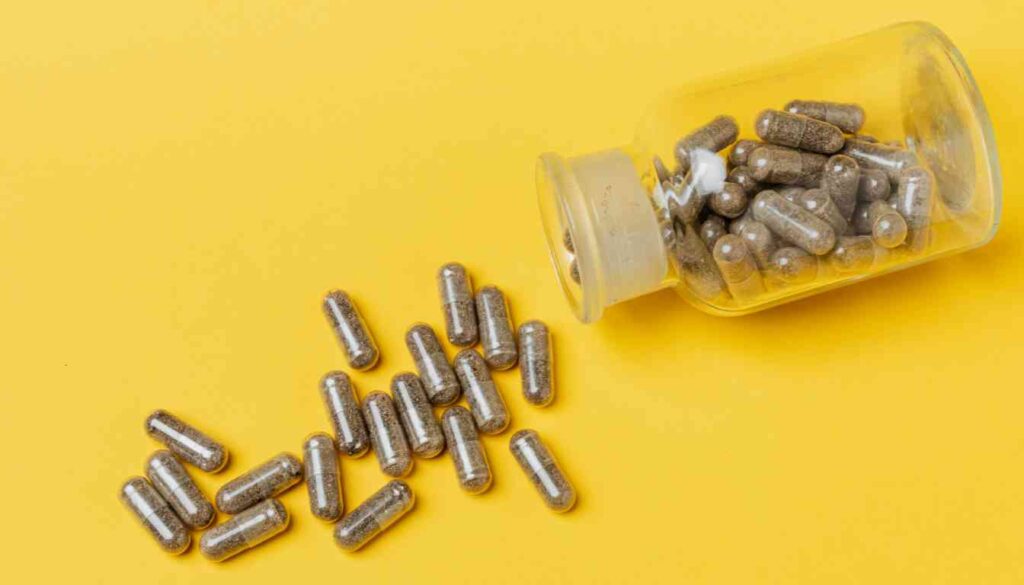Herbs and supplements have a long-standing history of being used to address various health concerns and promote overall well-being. As someone with a strong interest in natural treatments, I’ve found that incorporating herbs and supplements into my daily routine has been helpful in maintaining my health and preventing illnesses.
Herbal medicine involves using plants or plant extracts to treat a wide range of health problems. Some of the most popular herbs include echinacea, ginseng, and St. John’s wort. These herbs are believed to have various health benefits, such as boosting the immune system, reducing inflammation, and improving mental health.
Supplements, on the other hand, are products that contain vitamins, minerals, and other nutrients that are intended to supplement the diet. They come in various forms, including pills, capsules, and powders. While supplements can be beneficial for certain people, it’s important to note that they are not a substitute for a healthy diet and lifestyle. In this article, I will explore the benefits and potential drawbacks of using herbal medicine and supplements, as well as provide tips for incorporating them into your daily routine.
What Are Herbal Supplements?
As an herbalist, I have studied and worked with herbal supplements for many years. Herbal supplements, also known as botanicals, are dietary supplements made from plants or plant parts. These supplements come in many forms, including capsules, tablets, powders, and teas.
Definition and Types of Herbal Supplements
Herbal supplements are made from different parts of plants, including leaves, flowers, stems, roots, and seeds. They are used to support health and wellness and can be used for a variety of purposes, including immune support, stress relief, and digestive health.
There are many different types of herbal supplements available, each with their unique properties and benefits. Some popular herbs used in supplements include:
- Echinacea: used to support immune health
- St. John’s Wort: used to support mood and emotional health
- Ginger: used to support digestive health
- Turmeric: used to support joint health
It is important to note that not all herbal supplements are safe or effective. Some herbs can interact with medications or have side effects. It is important to talk to a healthcare provider before starting any new supplement regimen.
How They Differ from Traditional Medication
Herbal supplements differ from traditional medication in a few key ways. First, they are not regulated by the FDA in the same way that prescription and over-the-counter medications are. This means that the quality and safety of herbal supplements can vary widely.
Second, herbal supplements are often used to support overall health and wellness, rather than to treat specific medical conditions. While some herbs have been studied for their potential health benefits, many have not been extensively researched.
Herbal supplements can be a valuable tool for supporting health and wellness. However, it is important to approach them with caution and to talk to a healthcare provider before starting any new supplement regimen.
Safety Concerns and Interactions
As with any medication or treatment, there are potential safety concerns and interactions associated with herbal supplements.
Potential Side Effects and Drug Interactions
Herbal supplements can cause side effects and interact with prescription drugs, over-the-counter medications, and other supplements. For example, St. John’s wort can interact with antidepressants, birth control pills, and blood thinners. Echinacea can interact with immunosuppressants and medications that affect liver enzymes.
It is important to be aware of potential interactions and to talk to a healthcare professional before taking any herbal supplements. Some supplements may worsen certain conditions or interact with medications, causing serious side effects. For example, black cohosh can cause liver damage, and feverfew can increase the risk of bleeding.
The Importance of Consulting with a Healthcare Professional
It is important to consult with a healthcare professional before taking any herbal supplements. They can provide information about potential interactions, side effects, and precautions. Healthcare professionals can also help determine the appropriate dosage for a particular supplement and provide guidance on how to safely use it.
If you have a medical condition or are taking prescription medications, it is especially important to talk to a healthcare professional before taking any herbal supplements. Pregnant or breastfeeding women should also consult with a healthcare professional before taking any supplements.
while herbal supplements can provide benefits for certain conditions, it is important to be aware of potential interactions and side effects. Always consult with a healthcare professional before taking any supplements, especially if you have a medical condition or are taking prescription medications.
Popular Herbal Supplements and Their Uses
As more people turn to natural remedies for their health concerns, herbal supplements have become increasingly popular. Here are some of the most popular herbal supplements and their uses.
Saw Palmetto for Prostate Health
Saw palmetto is a type of palm tree native to the southeastern United States. It is commonly used to support prostate health and relieve symptoms of an enlarged prostate, such as frequent urination and difficulty urinating. Saw palmetto is available in capsules, tablets, and liquid extracts.
Garlic for Heart Health
Garlic has been used for centuries for its medicinal properties. It is believed to have heart-protective benefits, including lowering blood pressure and cholesterol levels. Garlic is available in many forms, including fresh cloves, supplements, and oils.
Echinacea for Immune System Support
Echinacea is a flowering plant that has been used for centuries to support the immune system and fight off infections. It is available in many forms, including teas, capsules, and liquid extracts. Echinacea is often used to prevent or treat the common cold and other respiratory infections.
St. John’s Wort for Depression
St. John’s Wort is a flowering plant that has been used for centuries to treat depression and anxiety. It is available in many forms, including teas, capsules, and liquid extracts. St. John’s Wort can interact with certain medications, so it is important to talk to a healthcare provider before using it.
Ginger for Digestive Issues
Ginger is a root that has been used for centuries to relieve nausea, vomiting, and upset stomach. It is available in many forms, including fresh ginger, supplements, and teas. Ginger is also believed to have anti-inflammatory properties and may help relieve pain and inflammation.
Ginseng for Energy and Vitality
Ginseng is a root that has been used for centuries to boost energy and vitality. It is available in many forms, including teas, capsules, and liquid extracts. Ginseng is also believed to have anti-inflammatory and antioxidant properties.
Herbal supplements can be a natural way to support your health and well-being. However, it is important to talk to a healthcare provider before using any herbal supplement, especially if you are taking medications or have a medical condition.
Before You Go – Herbal and Supplements

The use of supplements and herbal supplements is on the rise, with many people turning to these products as a form of treatment for various health challenges. However, it is important to keep in mind that the amount of scientific evidence on dietary supplements varies widely, with some having a lot of information and others having very little.
When considering using a dietary supplement or herbal supplement, it is important to consult with a healthcare professional, especially if you are taking any medications or have any health conditions. Additionally, it is important to read the label carefully and understand the ingredients and dosage recommendations.
While there is some scientific evidence supporting the effectiveness of certain supplements, such as turmeric as an anti-inflammatory and antioxidant, it is important to note that not all supplements have been thoroughly studied. Therefore, it is important to approach the use of supplements with caution and not make exaggerated or false claims about their effectiveness.
In terms of safety, it is important to note that supplements and herbal supplements are not regulated by the U.S. Food and Drug Administration (FDA) in the same way as medications. Therefore, it is important to purchase supplements from reputable sources and be cautious of online sellers.
Overall, the use of supplements and herbal supplements can be a useful addition to one’s health practice, but it is important to approach their use with caution and consult with a healthcare professional.
References – Herbal and Supplements
Little Herb Encyclopedia, by Jack Ritchason; N.D., Woodland Publishing Incorporated, 1995
The Ultimate Healing System, Course Manual, Copyright 1985, Don Lepore
Planetary Herbology, Michael Tierra, C.A., N.D., Lotus Press, 1988
Handbook of Medicinal Herbs, by James A. Duke, Pub. CRP Second Edition 2007
The Complete Medicinal Herbal, by Penelope Ody, Published by Dorling Kindersley
Check the Following Articles!
Herb or Spice: Understanding the Difference
Herb List: The Ultra Guide to Herbs Exploration
The High-Quality Brand You Need To Know: Herb Pharm
Herbal and Supplements: A Bridge to theherbprof.com
Herbal and Supplements and theherbprof.com are like two herbs in a healing potion, each enhancing the other’s potency. Let’s explore this herbal synergy!
Our Home Page at theherbprof.com is the heart of our herbal universe. It’s where we share our passion for herbs, their benefits, and how to use them. But what makes our heart beat? It’s our Herbal and Supplements section!
Frequently Asked Questions – Herbal and Supplements
1. Are herbal supplements safe for consumption?
Herbal supplements can be safe for consumption when taken correctly and in appropriate doses. However, it is important to note that herbal supplements are not regulated by the FDA in the same way that prescription drugs are. This means that the quality and purity of herbal supplements can vary greatly between manufacturers. It is important to do your research and consult with a healthcare professional before taking any herbal supplements.
2. Do herbal supplements have any side effects?
Like any medication or supplement, herbal supplements can have side effects. Some common side effects of herbal supplements include nausea, headaches, and allergic reactions. It is important to read the label and follow the recommended dosage. If you experience any adverse effects, stop taking the supplement and consult with a healthcare professional.
3. What are the benefits of taking herbal supplements?
Herbal supplements can provide a variety of benefits, depending on the specific supplement. Some herbal supplements have been shown to help with anxiety, depression, and sleep disorders. Others may help with digestive issues, such as bloating or constipation. It is important to note that while some herbal supplements may have benefits, they should not be used as a replacement for traditional medical treatment.
4. What are some common herbal supplements?
There are many different types of herbal supplements available. Some common herbal supplements include echinacea, ginkgo biloba, St. John’s wort, and turmeric. It is important to note that just because a supplement is labeled as “natural” does not mean it is safe or effective. It is important to do your research and consult with a healthcare professional before taking any herbal supplements.
5. How do herbal supplements compare to traditional medicine?
Herbal supplements and traditional medicine both have their benefits and drawbacks. Traditional medicine is backed by scientific research and is regulated by the FDA, while herbal supplements are not. However, herbal supplements may be a more natural alternative to traditional medicine and may have fewer side effects. It is important to consult with a healthcare professional to determine the best course of treatment for your specific needs.
6. Are there any risks associated with taking herbal supplements?
Yes, there are risks associated with taking herbal supplements. Some herbal supplements may interact with prescription medications, making them less effective or causing adverse effects. Additionally, some herbal supplements may not be safe for people with certain medical conditions. It is important to do your research and consult with a healthcare professional before taking any herbal supplements.
